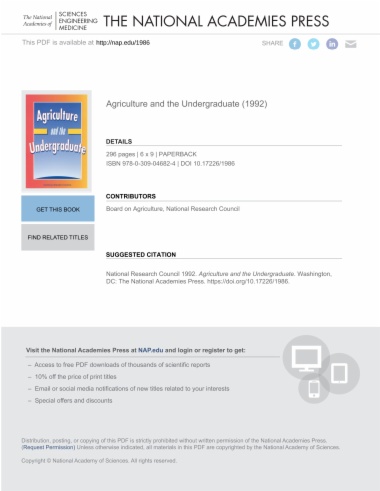This book presents efforts to chart the comprehensive changes needed to meet the challenges of undergraduate professional education in agriculture. The United States needs to invest in the future—in human capital and the scientific knowledge base—to revitalize one of its leading industries, the agricultural, food, and environmental system. That objective can be met by educating all students about agriculture as well as by educating others specifically for careers in agriculture.
Agriculture and the Undergraduate includes perspectives on rewarding excellence in teaching and formulating curricula to reflect cultural diversity, the environment, ecology, agribusiness and business, humanities and the social sciences, and the economic and global contexts of agriculture.
- Cover
- Front Matter
- Overview
- Title Page
- 1 Introduction
- Part I: Conference Papers
- 2 Rethinking Undergraduate Professional Education for the Twenty-First Century: The University Vantage Point
- 3 Rethinking Undergraduate Professional Education for the Twenty-First Century: The Public Policy Vantage Point
- 4 The Challenges for Professional Education in Agriculture: A Corporate Vantage Point
- 5 The Environmental Curriculum: An Undergraduate Land-Grant Future?
- 6 Environment and Ecology: Greening the Curriculum, A Public Policy Perspective
- 7 The Inherent Value of the College Core Curriculum
- 8 General Education and the New Curriculum
- 9 Agriculture: A System, a Science, or a Commodity
- 10 Educating a Culturally Diverse Professional Work Force for the Agriculural, Food, and Natural Resource System
- 11 Scientific Literacy: The Enemy is Us
- 12 The Priority: Undergraduate Professional Education as the Priority
- 13 Positioning Undergraduate Professional Education as the Priority
- 14 Science, Technology, and the Public
- 15 A Challenge, a Charge, and a Commitment
- Part II: Conference Discussions
- 16 Teaching and Research: Balance as an Imperative
- 17 Rewarding Excellence in Teaching: An Administrative Challenge
- 18 Integrating Agriculture into Precollege Education: Opportunities from Kindergarten to Grade 12
- 19 Toward Integrative Thinking: A Teaching Challenge
- 20 Striving Toward Cultural Diversity
- 21 Designing an Environmentally Responsible Undergraduate Curriculum
- 22 Breaking Tradiations in Curriculum Design
- 23 Changing the Image of Agriculture Through Curriculum Innovation
- 24 Teaching Science as Inquiry
- 25 Emphasizing the Social Sciences and Humanities
- 26 Teaching Agricultural Science as a System
- 27 The Social and Ethical Context of Agriculture: Is It There and Can We Teach It?
- 28 The Economic Context of Agriculture
- 29 The Global Context of Agriculture
- Appendixes
- A: Program Participants
- B: Poster Exhibits

